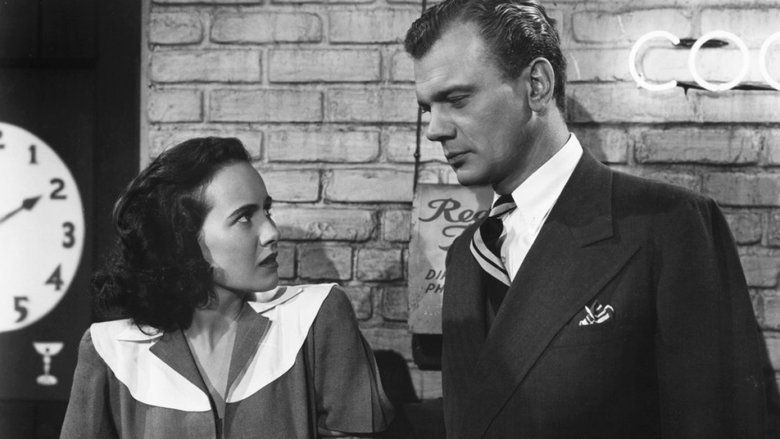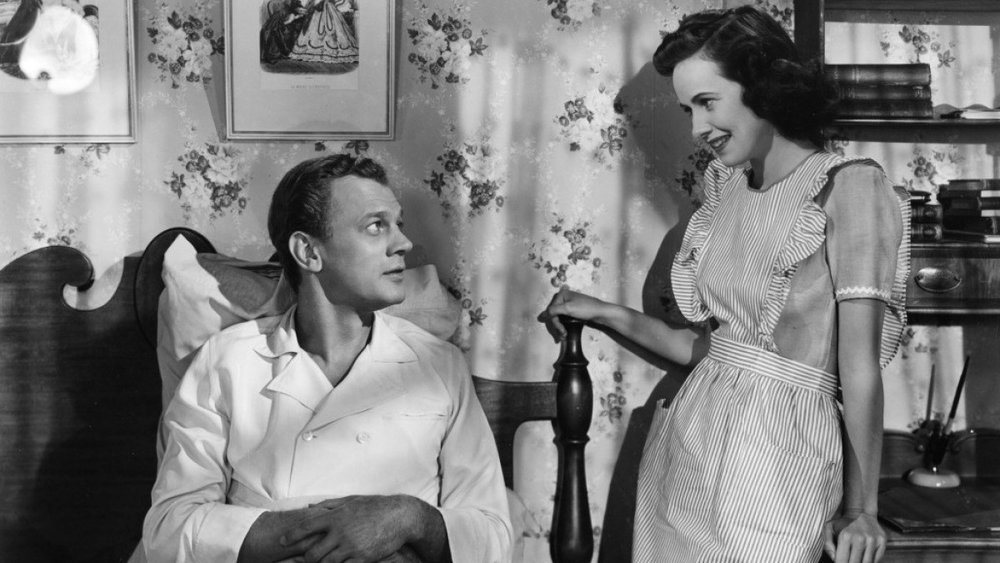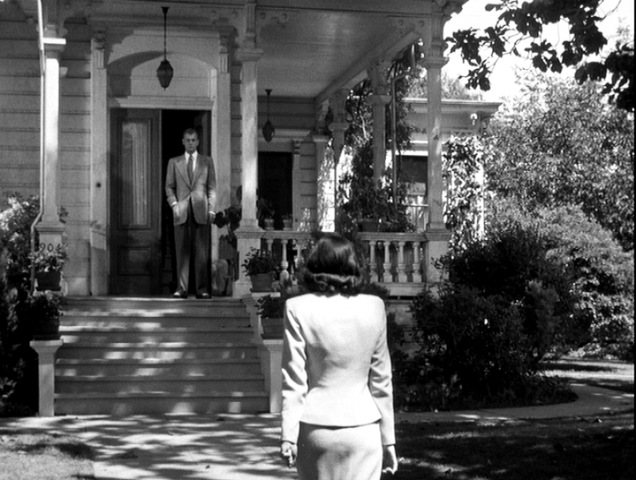← Back to Reviews

in
Shadow of a Doubt
Once again, Alfred Hitchcock's unparalleled directorial eye raises the bar on a deceptively simple psychological drama from 1943 called Shadow of a Doubt that requires viewer patience, but the master delivers an effectively layered drama rich with what the director did better than anyone else...suspense.

The film stars Teresa Wright as Charlotte "Charlie" Newton, a restless young woman who is a little bored with her small town life, which includes living with her flighty mother (Patricia Collinge), her quiet banker father (Henry Travers) and her kid brother and sister. Charlie is excited when she learns that her uncle, Charley Oakley (Joseph Cotten), who she was named after, comes for a visit. Charlie adores her uncle and has always considered him her spiritual animal, but certain behavior after Uncle Charley's arrival begins to concern her. She catches him tearing an article out of the newspaper and stuffing it in his coat pocket and when a census taker and photographer come to the house to interview the family. Charley wants nothing to do with it and when the photographer manages to get a picture of him anyway, Charley demands that the guy give him the film.

Uncle Charley's behavior and the constant conversations between her dad and his best friend, Herbie (Hume Cronyn) about the best way to commit murder piques Charlie's curiosity which is confirmed when it turns out the census take and photographer reveal themselves to be detectives and suspect that Uncle Charley might be "The Merry Widow Murderer" , who has killed three wealthy widows and took off with their money. On top of all of this, Charlie accompanied her Uncle to her father's bank, where Uncle Charley opened a savings account with $40,000.00.

This story was something a little different for Hitchcock. The screenplay was written by Thornton Wilder (Our Town) and Sally Benson (Meet Me in St. Louis), writers who were accustomed to writing stories about small town family life. Wilder is even awarded special billing in the opening credits and to juxtapose their keen insight regarding small town sensibility with an unsettling story about a possible murderer on the run turned out to be an effectively layered drama that takes a very deliberate pacing in setting up the exposition that we're almost halfway through the film before it becomes clear exactly what this movie is about.

What the screenplay doesn't offer and leaves unexplained, is almost made up for Hitchcock's masterful storytelling pinache. The opening scene of Cotten sleeping in a small rented room with money all around him on the dresser and the floor effectively introduces a character who's got a whole lot going on but we have no idea what. The camera zooming in on Cotten as he roughly grabs the newspaper article out of Wright's hand or the camera following Wright as she rushes to town to get to the library to figure out what's up with her uncle...suspense is created without really giving anything away.

There were a couple of small plot points that confused me. It seems like someone else has been arrested for Charley's crimes but for some reason, he still feels he has to silence his niece. And why would he give the ring that he took off one of his victims to his niece as a gift? I still found this riveting entertainment for the most part, even if it did take a minute to get going. Joseph Cotten was robbed of an Oscar nomination for his chilling performance and Wright is lovely as the fragile Charlotte whose transition into doubt and fear about her uncle is completely believable. Patricia Collinge was also wonderful as Wright's mother. She had Wright were fresh off playing family members in The Little Foxes. And who knew Hume Cronyn was ever that young with a full of head of hair? It's not the type of film that most would associate with Hitchcock, but the master's magical hand is all over this one.
Once again, Alfred Hitchcock's unparalleled directorial eye raises the bar on a deceptively simple psychological drama from 1943 called Shadow of a Doubt that requires viewer patience, but the master delivers an effectively layered drama rich with what the director did better than anyone else...suspense.

The film stars Teresa Wright as Charlotte "Charlie" Newton, a restless young woman who is a little bored with her small town life, which includes living with her flighty mother (Patricia Collinge), her quiet banker father (Henry Travers) and her kid brother and sister. Charlie is excited when she learns that her uncle, Charley Oakley (Joseph Cotten), who she was named after, comes for a visit. Charlie adores her uncle and has always considered him her spiritual animal, but certain behavior after Uncle Charley's arrival begins to concern her. She catches him tearing an article out of the newspaper and stuffing it in his coat pocket and when a census taker and photographer come to the house to interview the family. Charley wants nothing to do with it and when the photographer manages to get a picture of him anyway, Charley demands that the guy give him the film.

Uncle Charley's behavior and the constant conversations between her dad and his best friend, Herbie (Hume Cronyn) about the best way to commit murder piques Charlie's curiosity which is confirmed when it turns out the census take and photographer reveal themselves to be detectives and suspect that Uncle Charley might be "The Merry Widow Murderer" , who has killed three wealthy widows and took off with their money. On top of all of this, Charlie accompanied her Uncle to her father's bank, where Uncle Charley opened a savings account with $40,000.00.

This story was something a little different for Hitchcock. The screenplay was written by Thornton Wilder (Our Town) and Sally Benson (Meet Me in St. Louis), writers who were accustomed to writing stories about small town family life. Wilder is even awarded special billing in the opening credits and to juxtapose their keen insight regarding small town sensibility with an unsettling story about a possible murderer on the run turned out to be an effectively layered drama that takes a very deliberate pacing in setting up the exposition that we're almost halfway through the film before it becomes clear exactly what this movie is about.

What the screenplay doesn't offer and leaves unexplained, is almost made up for Hitchcock's masterful storytelling pinache. The opening scene of Cotten sleeping in a small rented room with money all around him on the dresser and the floor effectively introduces a character who's got a whole lot going on but we have no idea what. The camera zooming in on Cotten as he roughly grabs the newspaper article out of Wright's hand or the camera following Wright as she rushes to town to get to the library to figure out what's up with her uncle...suspense is created without really giving anything away.

There were a couple of small plot points that confused me. It seems like someone else has been arrested for Charley's crimes but for some reason, he still feels he has to silence his niece. And why would he give the ring that he took off one of his victims to his niece as a gift? I still found this riveting entertainment for the most part, even if it did take a minute to get going. Joseph Cotten was robbed of an Oscar nomination for his chilling performance and Wright is lovely as the fragile Charlotte whose transition into doubt and fear about her uncle is completely believable. Patricia Collinge was also wonderful as Wright's mother. She had Wright were fresh off playing family members in The Little Foxes. And who knew Hume Cronyn was ever that young with a full of head of hair? It's not the type of film that most would associate with Hitchcock, but the master's magical hand is all over this one.
